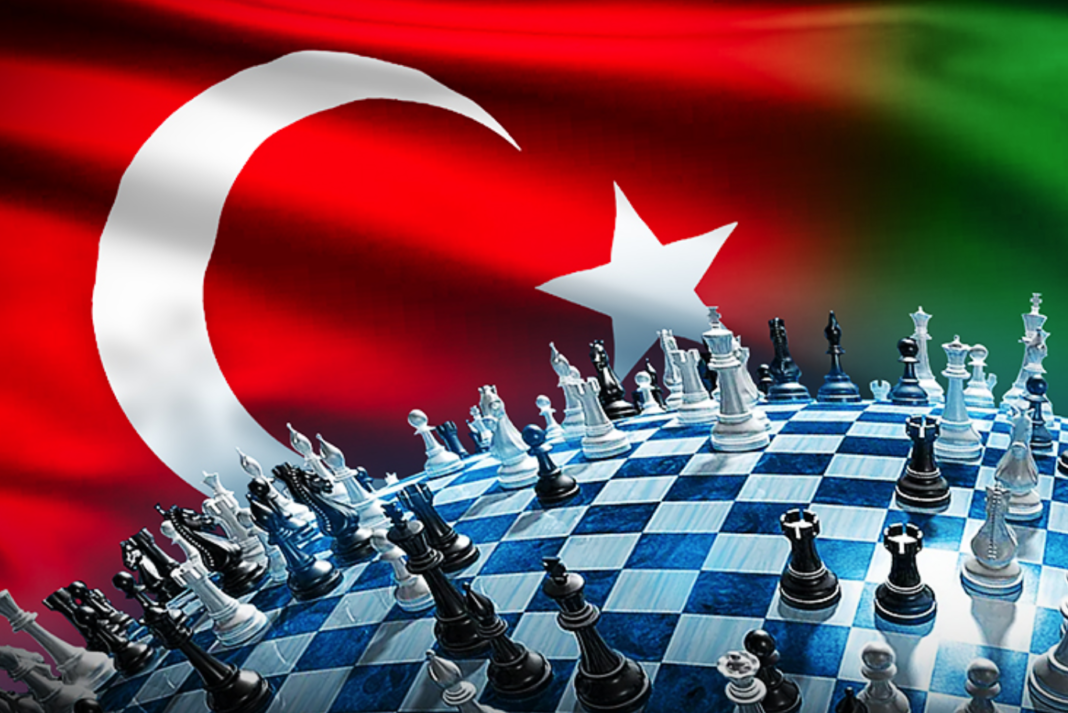« Facing a tough campaign for re-election in June, Erdogan is seeking reconciliation with his neighbours out of desperation and using diplomacy to bolster his chances. » Christopher Phillips analyze in Midde East Eye on February 3, 2023.
Turkey is undergoing a quiet diplomatic revolution. For much of the last decade, Ankara has weighed in firmly on one side of the various conflicts and disputes in its Middle Eastern neighbourhood.
It supported rebels in Syria, the embattled government in Libya, the overthrown Muslim Brotherhood president in Egypt, and the blockaded regime in Qatar.
As the region became more and more contested, these positions contributed to a sharp decline in Turkey’s relations with other major players, including the UAE, Saudi Arabia and Israel.
Yet, the past year has seen a change of course. Last February, Turkish President Recep Tayyip Erdogan confirmed a detente with the UAE during a visit to Abu Dhabi, while in May, he visited Jeddah to reconcile with Saudi Crown Prince Mohammed bin Salman.
In August, Turkey agreed to restore ties with Israel, four years after severing them over the killing of 60 Palestinians in Jerusalem protests.
Just before the opening ceremony of the World Cup in Qatar, Erdogan shook hands with Egyptian President Abdel Fattah el-Sisi and later said that Ankara could reset relations with Egypt following Turkey’s presidential and parliamentary elections in June.
In December, Turkey also ended its 11-year ostracism of the Syrian regime, when defence ministers met in Moscow, raising the possibility of a permanent thaw in ties.
‘Zero problems’
There are echoes of Ankara’s former policy of « zero problems with neighbours » in the recent regional activity. That policy, devised in the 2000s by Erdogan’s then-foreign minister Ahmet Davutoglu, aimed at improving Turkey’s historically fraught relations with its neighbours to improve Ankara’s regional influence and clout.
It proved highly successful, with Turkey enjoying strong diplomatic, trade and cultural ties by 2010, before Erdogan abandoned neutrality to back certain factions during the upheavals of the 2011 Arab uprisings.
Might the recent reconciliations hint at a revival of this past approach, a « Zero Problems 2.0 »?
Turkey is in a very different position today than it was in the 2000s, making it hard to revive Davutoglu’s approach. Back then, Turkey’s economy was booming, and much of its « zero problems » policy was aimed at finding new markets for the flourishing manufacturing and construction sector.
Improved ties with Syria, for example, allowed the flow of Turkish goods overland to entice Gulf markets, while closer ties with northern Iraq saw Turkish companies benefit from the Kurdistan Regional Government’s oil-driven prosperity.
Turkey’s politics similarly had many admirers. Erdogan was held up as a model to emulate, being a democratically elected, moderate Islamist who enjoyed strong ties with the US and EU – whose membership he courted – as well as with the Middle East.
In contrast, Turkey is in a weaker position today. Its economy is struggling after years of poor fiscal decisions by Erdogan and his government, with inflation hitting 85 percent last October.
Erdogan’s democratic credentials have been damaged after cracking down heavily on dissent, opposition groups and freedom of speech in the last decade.
His dreams of joining the EU have long since been abandoned by both Brussels and Ankara, while his ties with the US have similarly frayed, including being ejected from the F35 programme after buying Russian weaponry. In short, Turkey is in a far weaker regional position than in the 2000s.
Few concessions
This weakness is reflected in how few concessions have been granted by Ankara’s regional rivals prior to reconciliation.
Turkey first fell out with the UAE over its support for the Egyptian coup that toppled Erdogan’s Muslim Brotherhood allies in 2013. But Ankara did not demand any kind of shift in the UAE’s Egypt policy or an apology before re-opening ties.
Indeed, Turkey seemed more concerned to secure a much-needed $10bn Emirati investment in its beleaguered economy than righting past wrongs.
Similarly, tensions with Mohammad Bin Salman had heightened over the murder of Saudi dissident Jamal Khashoggi on Turkish soil, but Erdogan proved unable or unwilling to seek concessions on this from the crown prince as a condition for re-engaging.
The same is true with Israel. Tensions with Israel date back to the 2010 Mavi Marmara incident in international waters when Israel attacked a Gaza flotilla, and Erdogan has frequently championed the Palestinian cause. However, no improvement in their treatment was obtained as a condition for restoring ties – if anything, Palestinian rights are worse now than in 2010.
While it remains unclear whether relations with Syria will be normalised, Syrian President Bashar al-Assad is not expected to grant political concessions or apologise for the repression that prompted Ankara to sever relations in 2011. Most analysts believe Erdogan’s primary goal is to repatriate Turkey’s four million Syrian refugees, not squeeze Assad on human rights.
In marked contrast to the 2000s, Erdogan is today seeking reconciliation with his neighbours out of desperation. He is facing a tough campaign for re-election in June and is using diplomacy as a means to bolster his chances.
This might mean securing much-needed investment from the UAE or Saudi Arabia, or mending fences with Syria in the hope they’ll take back unpopular refugees. It seems less of a long-term regional strategy like « zero problems », and more like a short-term roll of the dice in the hunt for votes.
An Erdogan victory will not likely prompt a return to regional antagonism, but it would be short-sighted to think his recent reconciliations mark the dawn of a new era of Turkish regional neutrality.
Multiple concerns have driven Ankara’s latest detente diplomacy, but it is no « zero problems 2.0 ».
Middle East Eye, February 3, 2023, by Christopher Phillips.

